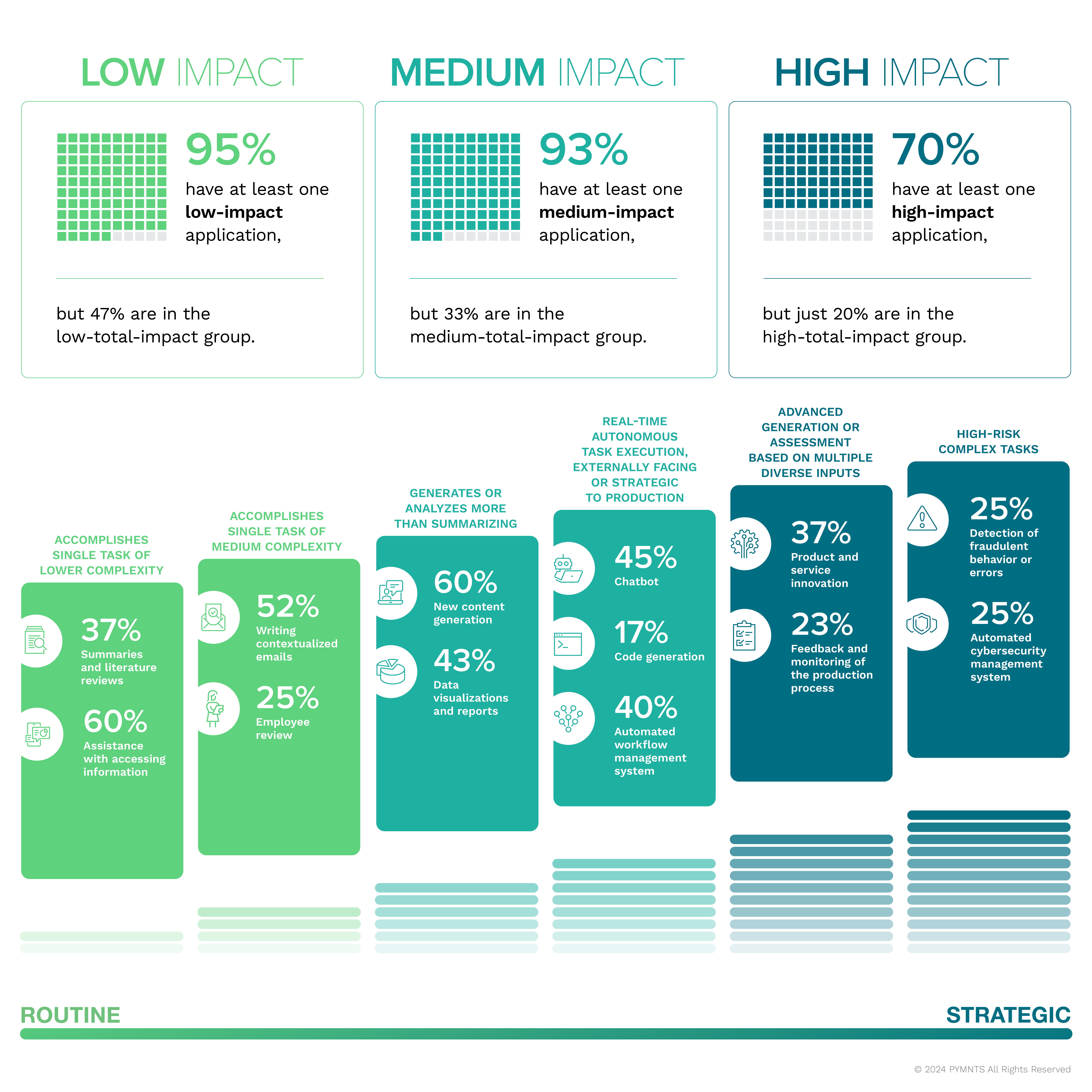Most surveyed chief marketing officers (CMOs) from firms generating at least $1 billion in annual revenue report that GenAI’s most significant use case for their businesses is market research and insights. As of July, CMOs used GenAI more to improve customer experiences and increase the speed of their own decision-making. Despite data showing falling return on investment (ROI) expectations related to GenAI, CMOs plan to increase their investments in this technology in the near future. However, implementation costs are not just financial. CMOs report concerns about organizational issues stemming from implementing GenAI.

Source: PYMNTS Intelligence
CMOs Leaning on GenAI For Market Research, Even As ROI Dips, September 2024
N = 60: Complete CMO respondents, fielded July 10, 2024 – July 19, 2024
While CMOs are aware of GenAI’s potential, they may be slower to implement it strategically and instead focus on making routine tasks efficient.
These are just some of the findings detailed in “CMOs Leaning on GenAI For Market Research, Even As ROI Dips,” the fifth edition of PYMNTS Intelligence’s 2024 CAIO Project. This series offers a monthly recap of the players and innovators using GenAI to revolutionize how they manage key parts of their businesses. This edition examines CMOs’ evolving perceptions of GenAI and draws on insights from 60 CMOs from U.S. firms that generated at least $1 billion in revenue last year, conducted from July 10 to July 19.
Key Findings
More and more, the most popular specific uses of GenAI among CMOs are to streamline creative processes and improve customer experiences.
GenAI’s benefits for market research and insights are catching on among CMOs like wildfire. Almost uniformly, CMOs agree that their most important use of the technology is to understand their customers’ needs, preferences and behaviors. As of July, more than 9 in 10 CMOs said they used GenAI for actions in the category of market research and insights. This marks a 24% increase in CMOs using the technology for market research and insights since we last asked them in April. Similarly, more than 8 in 10 said they used it to improve customer experience.
CMOs’ responses align with a growing agreement among executives on GenAI’s precise benefits. Its most popular specific uses include creating content and streamlining access to information for employees and customers. For each, 60% of CMOs said they had used the technology in that way. The data suggests that marketing research and insights teams lean more on the technology to meet internal and external needs.
CMOs are optimistic about GenAI’s future and plan to increase their investments in it despite lower perceptions of ROI.
CMOs’ perceptions of the significance of GenAI have notably evolved from when we last surveyed them in April. Now, 55% of CMOs plan to increase their investments in the technology — a 22% increase in just a few months. This uptick reflects what nearly all CMOs agree on: GenAI will help improve customer experiences, the speed of their decision-making and streamline operations. The data suggests that in just a short time, CMOs have gained confidence in embracing the capabilities of GenAI for the future of their businesses.
The shift in CMOs’ perception comes despite steadily declining perceptions of ROI from GenAI. Among middle-market firms, the share of CMOs reporting very positive ROI generated from GenAI was 23% three months ago and just 8.3% now. This decline in perceived ROI reflects a change in considering the technology as a short-term moneymaker in favor of a long-term strategy play. GenAI requires an initial investment from CMOs, both in acquiring an existing application and integrating it into their businesses’ workflows. The data suggests that CMOs may have reached the maximum level of return possible based on the applications they are currently using with GenAI. Consequently, CMOs are ready to increase their budget to increase their capabilities.
CMOs are increasingly concerned about the organizational issues that implementing GenAI causes.
CMOs may be committed to investing more in GenAI, but they are also dealing with the ripple effects of implementation. Their responses from April show that some of the biggest issues they faced with the technology have declined. In April, 70% of CMOs said they were unfamiliar with how the technology works, for example. Three months later, 63% say so, indicating CMOs are becoming more familiar with GenAI. CMOs also note reduced errors and output issues related to rolling out GenAI. This data suggests that CMOs are learning how to effectively integrate the technology.
However, while CMOs are more confident about working with the technology directly, its impact on other relationships is entering the spotlight. CMOs are 51% more concerned about the organizational issues GenAI causes than in April 2024. Their rising concerns include relying on vendors for GenAI and the transparency and bias this may produce as a result. CMOs may be uniquely concerned about how the technology affects the stream of information under their supervision.
Conclusion
Surveyed CMOs agree that continuing to increase their GenAI investments is critical for running their businesses. In three short months, CMOs increased their use of the technology for market research and insights by 24%. Their fervor for it remains constant despite falling ROI from this technology. While CMOs have more confidence in GenAI’s capabilities, they still face mounting organizational issues from its roll out.
Methodology
“CMOs Leaning on GenAI for Market Research, Even as ROI Dips,” is based on a survey of U.S. CMOs conducted from July 10 to July 19. The report explores the impact and perceptions of GenAI implementation for CMOs. Our sample included interviews with 60 CMOs from U.S. firms that generated at least $1 billion in revenue last year.
